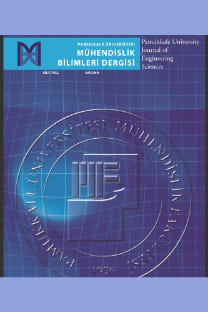Çapraz sevkiyatta kamyon çizelgeleme problemi için çözüm yaklaşımları
Çapraz
sevkiyat, bir dağıtım ağında, ürünlerin dağıtım merkezlerine gelen kamyonlar
aracılığıyla teslim edildiği, müşteri taleplerine göre konsolide edilerek
müşterilere teslim edilmek üzere giden kamyonlara yüklendiği yenilikçi bir
sistemdir. Bu çalışmada, çapraz sevkiyat merkezindeki her bir kamyonun kapılara
atanması ve kapılardaki sırasının belirlenmesine yönelik olan kamyon
çizelgeleme problemi ele alınmıştır. Belirtilen probleminin çözümü için belirli
bir çalışma süresi içinde yüklenen ürün sayısının en büyüklenmesi amacına sahip
bir matematiksel model ve Tavlama Benzetimi algoritması önerilmiştir. Farklı
test problemleri türetilerek matematiksel model ve meta sezgisel algoritmanın
sonuçları karşılaştırılmıştır.
Anahtar Kelimeler:
Çok kapılı çapraz sevkiyat merkezi, Kamyon çizelgeleme, Lojistik, Tavlama benzetimi
Solution approaches for truck scheduling problem in cross-docking
Cross
docking is an innovative system that products are distributed to the
distribution centers via trucks, consolidated according to customer demands,
and loaded into trucks to be delivered to customers. This study focuses on the
truck-scheduling problem, which consists of assigning each truck to a door at
the dock and determining the sequences. This study presents a mathematical
model and a Simulated Annealing Algorithm for door assignments and truck
scheduling in multi-door cross-docking centers. The objective of the model is
to maximize of the total number of shipping products within working time
period. The results of the mathematical model and the meta-heuristic algorithm
are compared by generating different test problems.
___
- Lee K, Kim BS, Joo CM. “Genetic algorithms for door-assigning and sequencing of trucks at distribution centers for the improvement of operational performance”. Expert Systems with Applications, 39(17), 12975-12983, 2012.
- McWilliams DL, Stanfield PM, Geiger CD. “The parcel hub scheduling problem: A simulation-based solution approach”. Computers & Industrial Engineering, 49, 393-412, 2005.
- Yu W, Egbelu PJ. “Scheduling of inbound and outbound trucks in cross docking systems with temporary storage”, European Journal of Operational Research. 184, 377-396, 2008.
- Van Belle J, Valckenaers P, Cattrysse D. “Cross-docking: State of the art”. Omega, 40, 827-846, 2012.
- Vahdani B, Zandieh M. “Scheduling trucks in cross-docking systems: Robust meta-heuristics”. Computers & Industrial Engineering. 58, 12-24, 2010.
- Boloori Arabani AR, Fatemi Ghomi SMT, Zandieh M. “A multi-criteria cross-docking scheduling with just-in-time approach”. International Journal of Advanced Manufacturing Technology, 49, 741-756, 2010.
- Larbi R, Alpan G, Baptiste P, Penz B. “Scheduling cross docking operations under full, partial and no information on inbound arrivals”. Computers and Operations Research, 38(6), 889-900, 2011.
- Boloori Arabani AR, Fatemi Ghomi SMT, Zandieh M. “Meta-heuristics implementation for scheduling of trucks in a cross-docking system with temporary storage”. Expert Systems with Applications, 38, 1964-1979, 2011.
- Boloori Arabani A R, Zandieh, M, Fatemi Ghomi SMT. “A cross-docking scheduling problem with sub-population multi-objective algorithms”. International Journal of Advanced Manufacturing Technology, 58, 741-761, 2012.
- Mohtashami A. “Scheduling trucks in cross docking systems with temporary storage and repetitive pattern for shipping trucks”. Applied Soft Computing, 36, 468-486, 2015.
- Amini A, Tavakkoli-Moghaddam R. “A bi-objective truck scheduling problem in a cross-docking center with probability of breakdown for trucks”. Computers and Industrial Engineering, 96, 181-190, 2016.
- McWilliams DL, Stanfield PM, Geiger CD. “Minimizing the completion time of the transfer operations in a central parcel consolidation terminal with unequal-batch-size inbound trailers”. Computers & Industrial Engineering, 54(4),709-720, 2008.
- Alpan G, Larbi R, Penz B. “A bounded dynamic programming approach to schedule operations in a cross docking platform”. Computers and Industrial Engineering, 60, 385-396, 2011.
- Boysen N, Briskorn D, Tschöke M. “Truck scheduling in cross-docking terminals with fixed outbound departure”. OR Spectrum, 35, 479-504, 2013.
- Konur D, Golias MM. “Cost-stable truck scheduling at a cross-dock facility with unknown truck arrivals: A meta-heuristic approach”. Transportation Research Part E, 49, 71-91, 2013.
- Liao TW, Egbelu PJ, Chang PC. “Simultaneous dock assignment and sequencing of inbound trucks under a fixed outbound truck schedule in multi door cross docking operations”. International Journal of Production Economics, 141, 212-229, 2013.
- Boysen N. “Truck scheduling at zero-inventory cross docking terminals”. Computers & Operations Research, 37, 32-41, 2010.
- Joo CM, Kim BS. “ Scheduling compound trucks in multi-door crossdocking terminals”. International Journal of Advanced Manufacturing Technology, 64, 977-988, 2013.
- Van Belle J, Valckenaers P, Berghe GV, Cattrysse D. “A tabu search approach to the truck scheduling problem with multiple docks and time windows”. Computers and Industrial Engineering, 66, 818-826, 2013.
- Kuo Y. “Optimizing truck sequencing and truck dock assignment in a cross docking system”. Expert Systems with Apllications, 40, 5532-5541, 2013.
- Wisittipanich W, Hengmeechai P. “Truck scheduling in multi-door cross docking terminal by modified particle swarm optimization”. Computers & Industrial Engineering, 113, 793-802, 2017.
- Chen F, Lee CY. “Minimizing the makespan in two-machine cross-docking flow shop problem”. European Journal of Operational Research, 193, 59-72, 2009.
- Boysen N, Fliedner M. “Cross dock scheduling: Classification, literature review and research agenda”. Omega, 38, 413-422, 2010.
- Saricicek I, Celik C, “Two meta-heuristics for parallel machine scheduling with job splitting to minimize total tardiness”. Applied Mathematical Modelling, 35, 4117-4126, 2011.
- Pinedo M. Scheduling: Theory, Algorithms, and Systems. 2nd ed. New York, USA, Prentice Hall, 2002.
- ISSN: 1300-7009
- Başlangıç: 1995
- Yayıncı: PAMUKKALE ÜNİVERSİTESİ
Sayıdaki Diğer Makaleler
Ali Paşa HEKİMOĞLU, Gizem AYATA
Biyodizel kaynaklı korozyon ve bozunma: Bir inceleme
Muhammet Kaan YEŞİLYURT, İlhan Volkan ÖNER, Efe Çetin YILMAZ
Gerçek bir sınav çizelgeleme problemi için iki aşamalı çözüm yaklaşımı
Rahime SANCAR EDİS, Emrah Bünyamin EDİS
Bayes ağları ile futbol analitiği: FutBA modeli
Drone ile teslimat rotalaması için bir matematiksel model
Sinem HAN, Begüm ÖZER, Barış ALİOĞLU, Özgür POLAT, Ayşe Tülin AKTİN
Gezgin satıcı probleminin melez akışkan genetik algoritma (MAGA) kullanarak çözümü
Spor giyim sektöründe marka tercihlerine ve tercih nedenlerine saklı Markov modelinin uygulanması
Çapraz sevkiyatta kamyon çizelgeleme problemi için çözüm yaklaşımları
